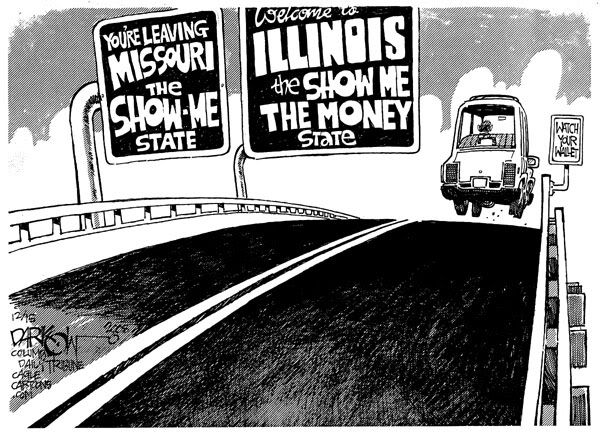
I submitted an op-ed piece to a few publications, but since it's seems to have been that "tree that falls in the forest", I have decided to publish it here.
Enjoy.
In America, principle trumps person
The great strength of the political system in the United States of America has been its Constitution; a document that puts principle above person. We have our federal representatives swear an oath to “preserve, protect and defend” it, not any party or group. We even hold a big celebration every four years to watch the president swear allegiance to that rulebook publically on January 20th. Our adherence to that document has protected us from demagogues and dictators. Our leaders have historically shown their respect for the concept of legal authority, whether it is Washington submitting his commission to Congress after the Revolution or Lincoln submitting to an election during the Civil War.
For our elected officials, there is a difference between what you want to accomplish, and what the law will allow. You can’t pick and choose which laws you will and will not enforce. Next time, it will be rules you may think are unjust, and you will have no legal recourse to fight or reverse the new stricture.
Abraham Lincoln was faced with this dilemma when he had to decide whether to follow his abolitionist tendency and free the slaves. He knew, as a good attorney, that he hadn’t the power to emancipate those in bondage. That would take a constitutional amendment. Thus, using his Commander-in-Chief power, he issued the Emancipation Proclamation which could only free those in the areas of the southern states that were in rebellion. This meant that in the slave states of Missouri, Delaware, Kentucky, and Maryland slaves would remain in captivity. The 13th Amendment ending slavery was ratified nearly 8 months after his assassination.
Franklin Roosevelt, widely acknowledged as one of our greatest presidents, tried to use his popularity and public support for his actions to do what he personally felt was right for the country. However, his executive order placing Japanese-Americans in internment camps during World War II was later ruled unconstitutional. Even his immense public popularity was blunted when, frustrated by a Supreme Court that ruled some of his New Deal agencies unconstitutional, he tried to advance a plan to “pack” the Court. He attempted to increase the number of justices in order to form a majority in his favor.
One of the reasons we admire a Gandhi or a Dr. King, is that they effected change through the moral high ground of the legal system. When they ran across an unjust law, they chose to break it and accept the consequences. Their jailing brought public attention to an unjust law. If governments simply ignore or fail to enforce the law, then the future leaders have an easy precedent for repeating this tactic.
Most recently, the Speaker of the House told a group of undocumented workers that raids conducted on illegal immigrants were “un-American”. The INS has recently been told to halt such raids until they get a further “clarification” on policy changes. In plainer words, the ICE agents are being told by their boss, the President of the United States, not to enforce the law at this time. This was in response to a campaign promise to “reform” immigration laws to allow these workers to become “legal.”
No one is above the law in the USA, but we have a good system for changing it. We can also amend the Constitution. The Constitution doesn’t simply grant power to our elected officials, but it denies power as well. Most of the amendments protecting our civil liberties begin, “Congress shall make no law…” Our founders designed a government with an intentionally slow process so that the people can become informed on the issues and communicate with their representatives.
Methods that defeat this process lead to embarrassing episodes like the recent AIG bonus flap. Had the feds not been in such a rush, the AIG bonus clause would have come to light prior to the signing of the “stimulus” bill. During the campaign, the President had promised he would make new bills available for online scrutiny for five days before he signed them. This did not happen. Moreover, Congress’ fix for this problem is to pass a law taxing 90% of the bonuses over a certain amount. Many experts believe this is a punishment for a “crime” that has not been established by law. We call that a “bill of attainder.” That would be unconstitutional! (Article I, Section 8) Congress should have to try to find another way to fix the mess it created with the AIG bonuses.
After all, more accountability, not less, should be the order of the day. Even more than a good end result, the path that we use to get there is of paramount importance. President Bush was criticized for putting “enemy combatants” in detention at Guantanamo Bay. Our “slow” process led to recent Supreme Court decisions which require the US government to establish certain legal procedures for the detainees. These decisions, made through a deliberately-paced process, led to a conclusion that protected our principles despite our anger over 9/11.
Whether one agrees with our governmental policies or not, it is critical that US voters continue to have confidence that their elected representatives will follow the law. They can’t be ruled by polls, protests, and political contributors, when making their judgments. Our elected officials need to respect the restrictions put on them by law, and honor the people who have trusted the legal framework that our Founders put in our Constitution so that principle can persevere over the emotional entrusting of popular leadership. As the historical examples of Ancient Rome, Revolutionary France, and 1930’s Germany demonstrated, allowing the adulation of persons over principles has historically led to the death of democratic republics.

